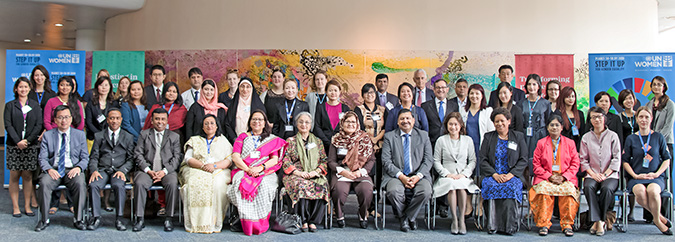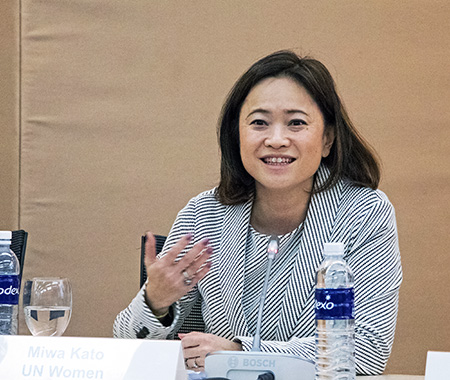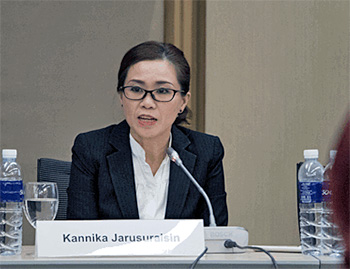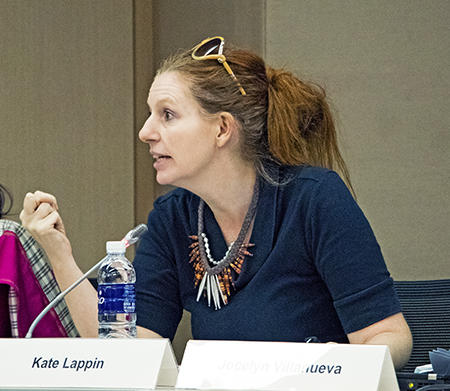Call for decisive measures to promote women’s economic empowerment in the changing world of work in Asia and the Pacific
Date:
Bangkok, Thailand — Women in the Asia-Pacific region face serious barriers to their full and active engagement in the economy and to improving their socio-economic status. The Asia-Pacific Policy Dialogue on “Women’s Economic Empowerment in the Changing World of Work”, held at the United Nations Conference Centre in Bangkok on the 23 – 24th of February 2017, concluded by recommending decisive measures to promote women’s economic empowerment. The meeting, organized by the UN Women Regional Office for Asia and the Pacific and the United Nations Economic and Social Commission for Asia and the Pacific (ESCAP), in collaboration UNFPA, ILO, FAO and UNEP, made action-oriented recommendations to turn the tide on gender inequality and ensure equal access to decent work for all. The recommendations expand on the background paper for the Policy Dialogue and will inform the upcoming Commission on the Status of Women in New York in March 2017.

High-level (inter)-governmental representatives from Ministries responsible for the advancement of Gender Equality, Ministries of Labour from 16 countries in Asia and the Pacific region, along with experts and practitioners from the private sector, academia, trade unions, civil society organizations and the United Nations gathered at the United Nations in Bangkok to discuss the gendered effects of key regional trends on women’s ability to participate and lead in the work environment at a par with men. Focus of the discussions were the effects of rapid technological advancement, the increasing role of the private sector in emerging economies, changing demographic trends, climate change and structural issues such as gender-based discrimination and violence against women, on women’s economic empowerment in the region.

High-level (inter)-governmental representatives from Ministries responsible for the advancement of Gender Equality, Ministries of Labour from 16 countries in Asia and the Pacific region, along with experts and practitioners from the private sector, academia, trade unions, civil society organizations and the United Nations gathered at the United Nations in Bangkok in a Policy Dialogue to discuss the gendered effects of technological advancement, the increasing role of the private sector in emerging economies, changing demographic trends, climate change and structural issues such as gender-based discrimination and violence against women, on women’s ability to participate and lead in the work environment at a par with men.

Participants from private sectors agreed on the important role and responsibility business is carrying. Especially in technology sector, “The gender gap in innovation and digitalization is stark and will further disadvantage women as jobs are transformed,” said Mr. Anshul Sonak, Regional Director-Innovation Programs, Asia Corporate Affairs Director from Intel Technology Asia Pte Ltd. In order to reverse the gap and encourage women entrepreneurs, “We have been working years to discover good examples in the field to inspire and empower women business owners,” said Ms. Kannika Jarusuraisin, P&G Thailand Director of External Relations.
“We need a just and equitable transition into energy democracy with women leading and managing clean renewable energy sources and green technology,” stated Kate Lappin, Asia Pacific Forum on Women, Law and Development (APWLD) during the panel discussion.

Participants called for decisive measures to promote women’s economic empowerment and made action-oriented recommendations[hyperlink] to turn the tide on gender inequality and ensure access to employment and the creation of decent work for all. Organized by UN Women Regional Office for Asia and the Pacific and the United Nations Economic and Social Commission for Asia and the Pacific (ESCAP), in collaboration UNFPA, ILO, FAO and UN Environment, participants deliberated and expanded on the recommendations made in the background paper for the Policy Dialogue.
Key recommendations made by participants, who are expected to be part of official government and civil society delegations informing the negotiations on this topic (women in the changing world of work) at the sixty-first session of the United Nations Commission on the Status of Women in New York in March 2017 and the High-Level Political Forum on Sustainable Development taking place in July 2017, where UN Members States will deliberate the eradication of poverty and the promotion of prosperity in today’s changing world, include the need to:
- Design macroeconomic policy to mobilize, distribute and allocate the maximum possible level of resources to realize women’s economic rights and to reduce gender inequality
- Protect labour and community organizing and the inclusion of women in all levels of economic and social policy decision-making
- Address the particular needs of the most marginalized women due to their status, type or location of work, in particular migrant, indigenous and rural women
- Address structural barriers to decent work and full employment for women workers
- Reform trade and development policy to hold governments and corporations to account and emphasize long-term inclusive and pro poor growth
- Address the particular needs of the most marginalized women due to their status, type or location of work, particularly for migrant, indigenous and rural women workers
- Recognize, reduce and redistribute care work between the market and the state and among men and women by collecting accurate time use information, investing in physical and social infrastructure and the public provision of quality child care, education and elder care, and implementing policies that support the equal distribution in the household of the provision of care
- Develop and finance gender-responsive strategies to prevent, mitigate and manage the impact of climate change and its related disasters in line with international and regional agreements in order to ensure a strong dedication to addressing the gendered aspects of climate change
- Recognise that a just and equitable transition to low carbon economies may support decent work opportunities for women, while redistributing care work
- Promote investment in clean, environmentally friendly and gender-sensitive technology to scale up women’s livelihoods, entrepreneurship and employment
- Recognise the role of women as technology producers as well as consumers and promote investment in research and technology for women and girls to address the gendered digital divide
At national level UN Women will, upon request, provide further support to governments and civil society to implement recommendations made.
The final recommendation report coming out of the Asia-Pacific policy dialogue will be released and shared with delegates and participants before CSW61.